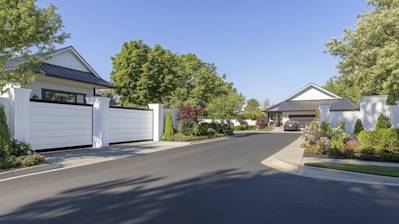Expert knowledge on wire fencing is essential whether you're a new homeowner securing your property, a farmer looking to keep livestock in place, or a landscaver looking to up your professional game. In this extensive blog post, we will thoroughly navigate through the significant aspects of wire fencing.
What is a Wire Fence?
A wire fence—often regarded as a chain-link, welded wire, or barbed wire fence—is predominantly used for both security and containment purposes. Its function is to enclose a particular area keeping it secured from intruders while safely containing children, pets, or livestock.
The Different Types of Wire Fences
There are primarily four types of wire fences to be aware of, namely:
- Barbed Wire Fence: Ideal for rural properties and farmlands. It deters cattle from pushing against the fence.
- Chicken Wire Fence: Perfect for keeping poultry in a confined area. Its intricate pattern prevents small animals from squeezing through.
- Welded Wire Fence: Typically used in gardens or residential properties. Its tight patterns ensure a pet or toddler cannot easily pass through.
- Chain Link Fence: It's wide applied because of its versatility, commonly used around playgrounds, homes, public areas, and factories for security purposes.
Installing a Wire Fence: A Step-By-Step Guide
If you opt to install the wire fence yourself, consider these steps:
Step 1: Planning Your Fence Layout
Measure and mark the parameters of your desired fence area. Strategically place the fence posts at regular intervals. Remember to mark the gate's location.
Step 2: Installing the Fence Posts
Dig holes at the marked spots. Then pour a bed of gravel for drainage followed by setting the post in the hole. Add concrete, leave it to set, and ensure all the posts are leveled.
Step 3: Adding the Wire
Starting from one corner or end post, roll out the wire fencing along the outside edge of the fence posts. Attach the wire to the posts using fencing staples or ties.
Step 4: Adding the Fence Gate
Secure your fence gate to the hinge post using hinge pins.
Step 5: Inspecting the Fence Installation
Inspect your fence installation—look for any loose spots and correct accordingly to ensure the fence is taught and robust.
Maintenance Tips for Your Wire Fence
To enjoy the longevity and effectiveness of your wire fence, here are several imperative maintenance tips:
- Regularly inspect for any wear or damage, especially after severe weather conditions
- If rust spots are spotted, they should be immediately cleaned using a wire brush followed by painting with rust-inhibiting paint
- Ensure the fence gates are not sagging and the latches function correctly
- Watch out for vegetation or tree growth around your fence as it can cause damage. Regular pruning or removal is necessary.
Why Choose a Wire Fence
Wire fences remain a top choice because of their simplicity, affordability, and versatility. They offer solid security measures without obstructing visibility. The various types of wire fences also cater to a plethora of needs, be it residential, industrial, or agricultural, making the wire fence a multipurpose solution.

Frequently Asked Questions about Wire Fence
What are the Different Types of Wire Fences?
There are numerous types of wire fences. The most common include woven wire fences, barbed wire fences, and welded wire fences. Chicken wire and deer fencing are other types used for specific purposes. Each type has unique characteristics and is useful in different situations.
Can I Install a Wire Fence Myself?
Yes! It takes some tools, time, and patience, but it's entirely possible to install a wire fence by yourself. You can find plenty of online tutorials to guide you through the process. However, if the project appears too massive, it might be best to hire a professional.
What Materials Do I Need to Install a Wire Fence?
Some of the essential materials include the wire (of your choice), fence posts, fasteners like staples or clips, tools like pliers and a hammer. You might also need cement for the fence posts, and a post hole digger or auger.
Do Wire Fences Rust?
Most modern wire fences are galvanized, which means they're coated with a layer of zinc to prevent rust. However, over time, with exposure to the elements, even galvanized wire can rust. Regular inspections and maintenance can help prolong the life of your wire fence.
How Can I Prevent My Wire Fence from Rusting?
The best way to prevent rust is to take care of your fence. Clean it regularly to remove any dirt and debris that could wear down the protective coating. If parts of your fence do begin to rust, use a wire brush to remove the rust and apply a rust converter to protect the metal.
How Do I Repair a Wire Fence?
Repairing your wire fence depends on the type of damage. For small breaks or holes, you might be able to patch the area with a spare piece of wire and some wire ties. More significant damage may require you to replace a whole section of the fence.
What is the Life Expectancy of a Wire Fence?
With proper care and maintenance, a wire fence can last up to 20 years or more. However, this can vary depending on the type of wire used, the quality of the installation, and the climate and weather conditions in your area.
Can a Wire Fence Be Painted?
Absolutely! Painting a wire fence can be a great way to enhance its look and add a personal touch. Before painting, ensure the fence is clean so that the paint can adhere properly. Using a spray paint can make the process quicker and more manageable.
What are the Regulations Around Wire Fences?
Regulations can differ based on location, so it's important to check with your local city or county office before installing a wire fence. There may be restrictions concerning height, location, or type of fence material you can use.
How Do I Maintain a Wire Fence?
Routine maintenance includes keeping the fence clean, checking for signs of damage regularly, and repairing any broken or sagging sections promptly. Also, keep the vegetation around the fence trimmed; overgrown plants can damage the fence over time.

Pros of Wire Fence
Cost-Effective
One of the significant advantages of wire fences is that they are more affordable compared to other fencing options like wooden, vinyl, or metal fences. They require less material and labor to install, making them an excellent choice for landowners who need to fence large areas but are on a tight budget.
Easy to Install
Wire fences are fairly easy to install. They don't require extensive groundwork, which means you can save time and labor costs. They are lightweight and can easily be rolled out and secured using fence posts. Even if you're not a DIY expert, you may still be able to install a simple wire fence with minimal effort.
Versatility
A third pro is the versatility wire fences offer. They come in different types, such as welded wire fences, chicken wire, barbed wire, or electric wire fences, each designed to match specific uses. Whether you're keeping poultry, deterring trespassers, or marking property boundaries, you can always find a wire fence that suits your needs.
Durability and Maintenance
Wire fences are highly durable, especially those made from galvanized steel, which is resistant to rust and corrosion. They can withstand harsh weather conditions, providing reliable performance over the years. They are easy to repair if a section gets damaged. In terms of maintenance, they need less attention compared to wooden fences, which require regular painting or staining to prevent rot and decay.
Cons of a Wire Fence
Limited Privacy
The most apparent drawback to wire fencing is the lack of privacy. Wire fences are see-through and offer little to no visual barrier. Thus, if you're looking for a fence that will offer privacy, a wire fence might not be the best choice.
Potential Injury
Some types of wire fences, like barbed or razor wire, can be potentially dangerous to animals and even humans. Animals can get entangled in them, leading to injuries. Similarly, humans can also get hurt if they accidentally come into contact with the fence.
Aesthetics
From an aesthetic perspective, wire fences might not be the most appealing. They lack the charm and warmth of fences like wooden or wrought-iron fences. If you're conscious about the visual appeal of your property, a wire fence may not meet your requirements.
Limited Security
While barbed or razor wire fences might deter trespassers due to the risk of injury, general wire fences offer limited security. They can easily be cut or climbed over by intruders. Plus, because they are see-through, intruders can see what is on the property.
Susceptible to Damage
Despite their durability, wire fences can still be susceptible to damage. They may sag or get bent out of shape due to strong winds, heavy snowfall, or if a heavy object falls against them. Moreover, animals, large or small, can damage the fence breaking through it, requiring you to undertake regular repairs.
No Noise Reduction
Unfortunately, wire fences do nothing to reduce noise from the surrounding environment. If you live in a noisy area and hope a fence can provide some level of quiet, a wire fence is not the ideal choice.

Myths / Misconceptions about Wire Fences
Wire fences are a common fixture in many landscapes, from rural farmlands to suburban backyards. They are used to achieve a variety of purposes like securing premises, marking boundaries, or even for decoration. Despite the multitude of benefits they bring along, there are many misconceptions and myths surrounding these fences. These misapprehensions can lead to malpractices or improper usages, resulting in diminished utility and lifetime. Let's take a look at the most common myths and delve into the truths.
Myth 1: All Wire Fences are the Same
The Truth:
One of the biggest misconceptions about wire fences is that they are all the same, with no real differences other than maybe their visual appearance. In reality, there are different types of wire fences designed for varied purposes. Some key types include:
Chain Link Fences: These are made by weaving wires into a tight diamond pattern, offering a durable and secure boundary.
Barbed Wire Fences: Ideal for security purposes, these fences have sharp points at regular intervals.
Welded Wire Fences: Made by welding steel wires together at each intersection, these are sturdy and often used for livestock containment.
Therefore, not all wire fences are the same, and choosing the right type depends on the intended use.
Myth 2: Wire Fences are Only for Security
The Truth:
While wire fences do serve as an effective security measure, it is a misconception to believe that this is their only function. Depending on the type and design, wire fences can be used for decoration, improving privacy, or even for training plants in gardens. For instance, a wire fence with a trellis design can serve as a support structure for climbing plants. For those interested in ensuring privacy, vinyl-coated wire fences can obstruct outside view to a certain extent.
Myth 3: Installation of Wire Fences is Easy and Can be Done by Anyone
The Truth:
It's common to believe that anyone can install a wire fence. However, wire fence installation can be more complex than it looks. From determining the fence line and digging post holes to ensuring the fence is level and secure, there are numerous steps involved. Certain types of wire fences, like barbed or razor wire fences, can also pose safety risks during installation. Therefore, professional installation is often recommended to ensure the fence is installed correctly and securely.
Myth 4: Wire Fences Require No Maintenance
The Truth:
Another common misconception about wire fences is that they require no maintenance. Like any outdoor structure, wire fences can degrade over time due to factors like weather conditions or rust. Regular inspections and maintenance, such as cleaning, rust removal, and repair of damaged sections, can significantly extend the life of a wire fence.
Myth 5: Wire Fences are Not Safe for Pets and Children
The Truth:
Some people believe that wire fences are not safe for pets and children; however, this largely depends on the type and installation of the fence. For example, chain link fences and welded wire fences with small openings can safely contain pets without posing a risk of injury. Likewise, using a wire fence with smooth surfaces and no sharp points can make it safe for children as well. The key factors are choosing the right type of fence and installing it correctly.
It is crucial to bust these myths about wire fences, understand their various benefits and uses, and manage their installation and maintenance accurately. By doing so, one can make the most of these versatile structures in a safe and beneficial way.
Summary
Wire fences are versatile and durable, making them useful in various circumstances. Whether you want to safeguard your property, corral animals, or set up a boundary, a wire fence can efficiently serve your purpose. It's also more cost-effective compared to other fences. Best of all, it requires minimal maintenance and can stand the test of time.
Choosing a wire fence is a practical decision that doesn't force you to compromise on aesthetics. With various styles, designs, and finishes, you can pick a wire fence that complements the look of your surroundings. Not to mention, the installation process is pretty straightforward, so even if you're a beginner, you can put it up with ease.
To wrap up, a wire fence is the embodiment of function and form working hand in hand. It provides you with the security and boundary marking functions you require. At the same time, it contributes to the overall aesthetic appeal of your property or space. In terms of security, cost-effectiveness, maintenance, and easy installation, a wire fence really does tick all the boxes.
About Ornamental Solutions
Ornamental Solutions is a family-run operation located smack-dab in the heart of Sacramento, CA. We're true locals and we boast quite an obsession with all things ornamental! For over 2 decades, we've been passionately creating and providing unique, high-quality decorative solutions for homes and businesses in our community. We're not just about jazzing up your space; we're all in for the personal touches, the details that make your environment feel uniquely yours. So, whether you're on a quest for the perfect ornamental ironwork, landscape adornments, or custom-made decorative features, you're in the right place! Hop on board and let our dedicated crew at Ornamental Solutions make your aesthetic dreams come to life.








